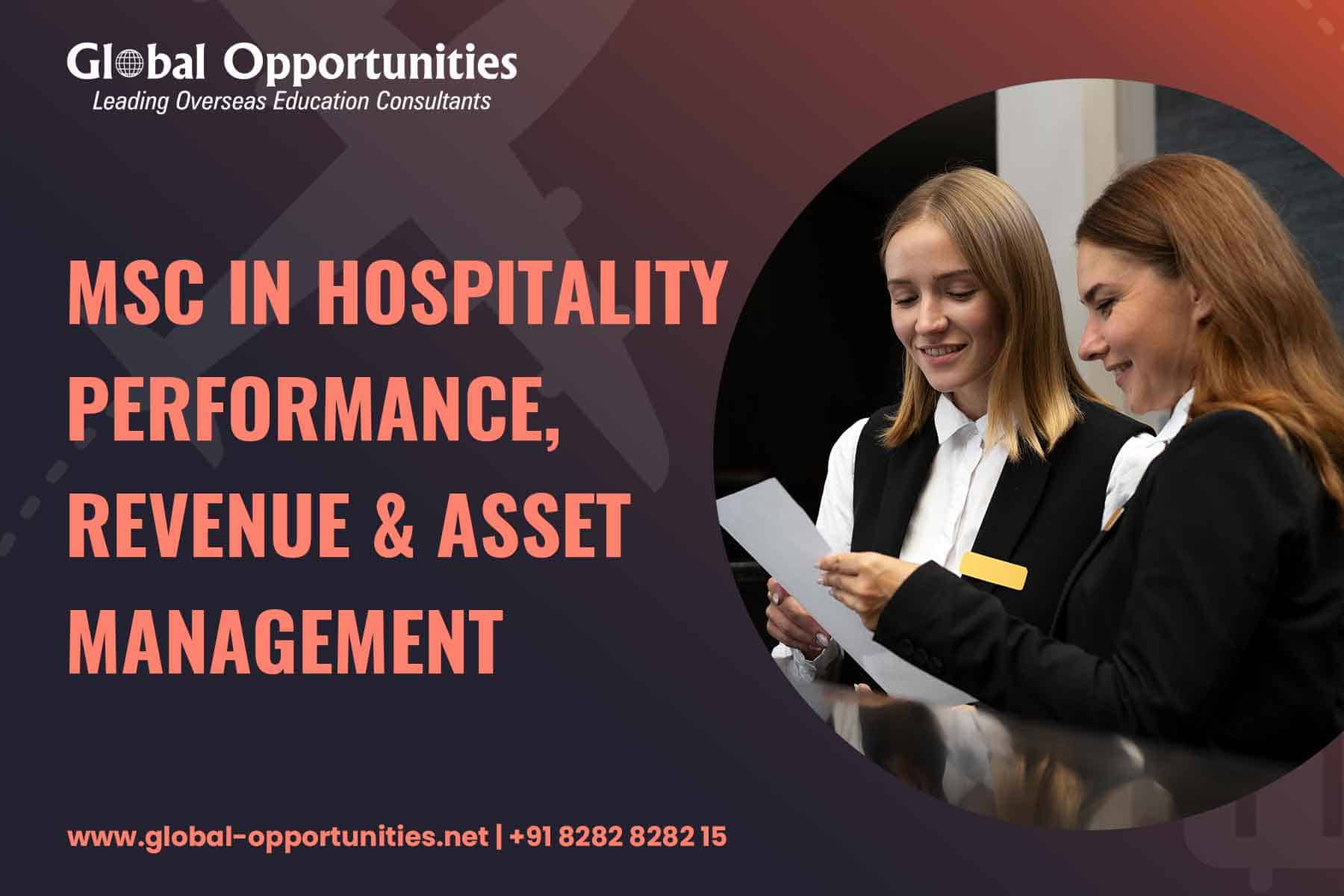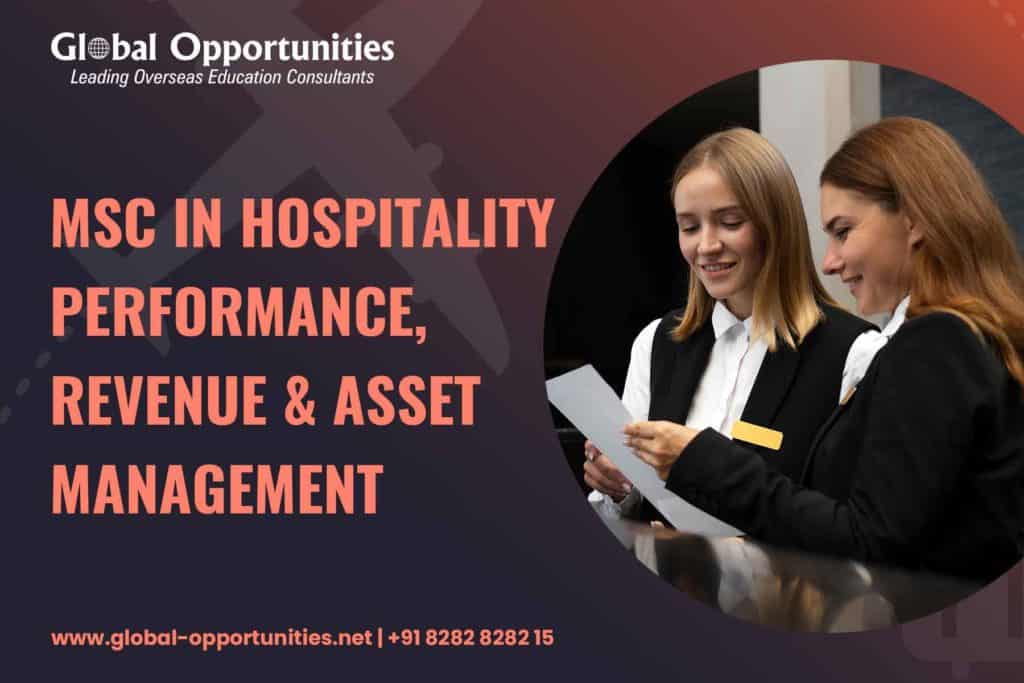MSc in Hospitality Performance, Revenue & Asset Management

 An MSc in Hospitality Performance, Revenue & Asset Management course talks about revenue analysis, forecasting future asset performance and also predicting and mitigating risk. Students looking for studying abroad also learn to explore more about business analytics and yield management techniques (production) and the dynamic needs of the business environment.
An MSc in Hospitality Performance, Revenue & Asset Management course talks about revenue analysis, forecasting future asset performance and also predicting and mitigating risk. Students looking for studying abroad also learn to explore more about business analytics and yield management techniques (production) and the dynamic needs of the business environment.
A number of universities around the world provide MSc in hospitality Performance, Revenue and Asset Management courses at much affordable cost. Graduates after completing this course have an opportunity in the fields of revenue management, performance management, and asset management.
Top Universities Providing MSc in Hospitality Performance, Revenue and Asset Management
| University Name | Degree Name | Location |
| University of Surrey | MSc in International Hospitality Management | Surrey, UK |
| Cornell University | MSc in Hospitality Management – Revenue Management & Asset Management | USA |
| Oxford Brookes University | MSc in International Hospitality, Events, and Tourism Management | UK |
| University of Central Florida | MSc in Hospitality and Tourism Management – Revenue Management | Florida, USA |
| Ecole Hôtelière de Lausanne (EHL) | MSc in Hospitality | Switzerland |
| Glion Institute of Higher Education | Master of Science in Hospitality, Entrepreneurship, and Innovation program | Switzerland |
| Les Roches Global Hospitality Education | MSc in Hospitality Leadership | Switzerland |
| Hong Kong Polytechnic University | MSc in International Hospitality Management | Hong Kong |
| University of Strathclyde | MSc in International Hospitality and Tourism Management | United Kingdom |
Advantages of MSc in Hospitality Performance, Revenue and Asset Management
Obtaining an MSc in Hospitality Performance, Revenue and Asset Management can offer several advantages to individuals pursuing careers in the hospitality industry, some of these advantages include:
- Specialized Knowledge: An MSc program in this field provides in-depth knowledge and understanding of key concepts, techniques, and best practices related to hospitality performance, revenue management, and asset management. This specialized knowledge can make graduates highly sought after by employers in the hospitality sector.
- Career Advancement: Holding an MSc degree in Hospitality Performance, Revenue, and Asset Management can enhance career prospects and open up opportunities for advancement within the hospitality industry. Graduates may qualify for higher-level positions such as revenue manager, asset manager, hotel manager, or director of operations.
- Industry-Relevant Skills: MSc programs in this field typically emphasize the development of practical skills and competencies relevant to the hospitality industry. Students may gain expertise in areas such as financial analysis, revenue optimization strategies, asset valuation, performance measurement, and operational efficiency.
- Strategic Decision-Making: Graduates of MSc programs in hospitality performance, revenue, and asset management are equipped with the analytical tools and strategic thinking abilities needed to make informed decisions in a dynamic and competitive business environment. They can contribute to the development and implementation of effective strategies to maximize revenue, manage assets efficiently, and enhance overall performance.
- Global Perspective: Many MSc programs in hospitality management have an international focus, providing students with opportunities to gain insights into global trends, challenges, and opportunities in the hospitality industry. This global perspective is valuable for professionals working in diverse hospitality environments and catering to an international clientele.
- Networking Opportunities: MSc programs often offer networking opportunities with industry professionals, alumni, and guest speakers, allowing students to build valuable connections and relationships within the hospitality industry. These connections can lead to internship opportunities, job offers, and collaborations on research projects or industry initiatives.
- Personal and Professional Growth: Pursuing an MSc in Hospitality Performance, Revenue, and Asset Management involves rigorous academic study, research, and practical experiences that contribute to personal and professional growth. Graduates develop critical thinking skills, problem-solving abilities, leadership qualities, and a deeper understanding of the complexities of the hospitality business.
Eligibility MSc in Hospitality Performance, Revenue & Asset Management
The Eligibility of MSc in Hospitality Performance, Revenue & Asset Management for international Students:
- Educational Background: Applicants should have a bachelor’s degree or its equivalent from a recognized institution. The bachelor’s degree may be in hospitality management, hotel management, tourism management, business administration, economics, finance or related fields. In addition to this some programs may even require a minimum GPA (Grade Point Average) for undergraduate studies.
- English Language Proficiency: Since the medium of instruction for most MSc programs is English, international students whose native language is not English are usually required to demonstrate proficiency in English. This is typically done by providing scores from recognized English language proficiency tests such as TOEFL (Test of English as a foreign language), IELTS (International English Language Testing System), PTE (Pearson Test English). Each university sets its minimum score requirements for these tests.
- Letters of Recommendation: Graduates applying for MSc in Hospitality Performance, Revenue and Asset Management need to submit letters of recommendation as part of the application process. These letters of recommendation are typically written by professors, employers or other individuals who can attest the applicant’s academic abilities, work ethics and suitability of the program.
- Statement of Purpose: A very important factor for admission into university is the statement of purpose which states candidates’ purpose, scope and criteria for joining the MSc in hospitality performance, revenue and Asset management course.
- Interview: Some universities hold interviews for candidates in order to check the candidates confidence level and further the purpose of pursuing the required MSc in hospitality performance, revenue and Asset Management course.
Challenges to MSc in Hospitality Performance, Revenue & Asset Management
Pursuing a Masters in Hospitality Performance, Revenue and Asset Management course holds several challenges, however overcoming those challenges can lead to valuable, professional growth and advancement in the hospitality industry. Some of the key challenges includes:
- Complexity of the Industry: The hospitality industry is complicated and constantly evolving. It is very important to understand the issues of managing performance, revenues and Assets in this dynamic environment which also requires a deep understanding of various concepts, which includes finance, marketing, operations and technology.
- Data Analysis Skills: In this current digital world, hospitality increasingly relies on data driven decision making. It is very important to have proficiency in data analysis tools and techniques to extract meaningful insights from large datasets. Any inconsistency in data handling can lead to limited prior experience in this area.
- Global Perspective: Hospitality is one of the largest and a global industry where studying performance, revenue and asset management requires a detailed understanding of international markets & regulatory environments. It can definitely be challenging but it is super essential for success in a globalized industry.
- Technological Advancements: The hospitality industry is rapidly adopting technological innovations to streamline operations, enhance guest experiences, and optimize revenue management. Keeping pace with emerging technologies such as revenue management systems, customer relationship management (CRM) software, and data analytics platforms may require continuous learning and adaptation.
- Industry Experience: Many MSc programs in hospitality management prefer candidates with relevant industry experience. If you are transitioning from a different field or have limited experience in hospitality, gaining practical exposure through internships, part-time work, or industry certifications may be necessary to complement your academic studies.
- Work-Life Balance: Balancing academic coursework, internships, or part-time jobs with personal commitments can be demanding, particularly in a rigorous program like MSc in Hospitality Performance, Revenue & Asset Management. Developing time management skills and prioritizing tasks effectively are essential for maintaining a healthy work-life balance.
Conclusion to MSc in Hospitality Performance, Revenue & Asset Management
In Conclusion, MSc in Hospitality Performance, Revenue & Asset Management presents both opportunities and challenges for personal and professional growth in the dynamic hospitality industry. Therefore, as the candidates navigate the complexities of the field, they must remain adaptable, innovative and committed to continuous learning. Through rigorous academic coursework, hands-on experiences, and exposure to industry best practices, we can develop the skills and knowledge necessary to excel in managing performance, optimizing revenue, and maximizing asset value within hospitality organizations. Embracing data-driven decision-making, leveraging technological advancements, and fostering a global perspective will be critical in addressing the evolving needs and expectations of guests, stakeholders, and investors.
FAQs
What is the application of revenue management in the hospitality industry?
The revenue management in the hospitality industry analyzes the occupancy rates, demand patterns and market trends to help develop pricing strategies to further attract customers for optimal profitability. In addition to this it also involves effective inventory management, such as monitoring room availability, managing the room types and determining hotel guests’ optimal length of stay.
Which hotel company is the first to apply revenue management strategies?
Hotel companies such as Marriott International were one of the first major players to draw large earnings by introducing the concept into its business strategies and Hotel Revenue Management in the 1990s.
What is total operating revenue for a hotel?
Your total operating revenue encompasses the combined value of room revenue and ancillary revenue. Familiarizing yourself with these distinct concepts is essential prior to computing various revenue streams within your hotel.



